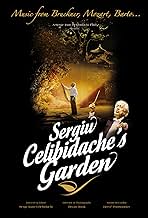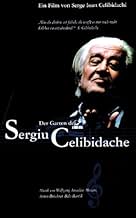Ajouter une intrigue dans votre langueA once-in-a-lifetime insight into the wondrous universe of fabled conductor Sergiu Celibidache. Madman to some, genius to most, teacher and master to many. An intimate portrait and a journey... Tout lireA once-in-a-lifetime insight into the wondrous universe of fabled conductor Sergiu Celibidache. Madman to some, genius to most, teacher and master to many. An intimate portrait and a journey into his singular universe. The artistry, the mysticism, all the way into his inner sanct... Tout lireA once-in-a-lifetime insight into the wondrous universe of fabled conductor Sergiu Celibidache. Madman to some, genius to most, teacher and master to many. An intimate portrait and a journey into his singular universe. The artistry, the mysticism, all the way into his inner sanctum, his Garden.
- Director
- Writer
- Star
- Prix
- 17 victoires et 10 nominations au total
Histoire
'The Garden of Celibidache' was for me an absolute joy from start to finish and has become one of my all time favourite documentaries for anything. Although the earlier 'Celibidache You Don't Do Anything You Let it Evolve' is absolutely wonderful, 'The Garden of Celibidache' is even better. Due to more concert footage, rehearsal segments being longer and more extensive and with more variety regarding what Celibidache talks about in teaching and rehearsing. It also sees him in a wider variety of moods. For fans of Celibidache, who has as of now inspired, moved and educated me than any other conductor, this is a must. It may test the patience of some, with the long length and with some of it being quite meditative in pace (like Celibidache's unorthodox but richly rewarding choice of tempos that moves many but alienates others), but it certainly didn't in my case.
Visually, 'The Garden of Celibidache' is one of the best looking documentaries for anything seen in a long time. The nature shots in particular are absolutely breathtaking and quite poetic and effective in their simplicity, plus Celibidache's garden is just stunning and like a character of its own. The music cannot in any way be complained about. Not just the goosebump inducing clips of Bruckner's ninth symphony being performed in concert (from memory it was one of the great man's, meaning Celibidache and the concert, last), but also Mozart Requiem in rehearsal and a new discovery for me in the Bartok.
Celibidache comes over very engagingly and in an illuminating way here, whether teaching, rehearsing, in concert or on his own. It was wonderful to see an intimate and simpler side to somebody who was very complex and who had a reputation for being difficult. His very philosophical way of thinking regarding music making, how to interpret a piece and even religion is going to induce a mix of amazement and bewilderment, but regardless of whether you understand it or not what he says on everything throughout is worth pondering on.
His way of teaching is very sharp, direct and extremely brutal (that was obvious too in the earlier Celibidache documentary, but those segments were mild compared to here), he doesn't miss a trick and takes no prisoners. Not to mention very talkative with very complicated instructions given, but it definitely gets results and despite looks of intimidation and perplexity it was clear that the students admired and respected him. It was clear too that he had inspired them, and to me the reason why he taught in this way was that he saw potential and wanted the students to not just reach that potential but also exceed it and a crack of the whip teaching style is needed for that. But it is not just sharpness and verbal brutality, there are times too where he comes over like a wise grandfather with warm humour and a heart of gold. "Music is you" for example is such a profound phrase.
Something that is even more obvious in the rehearsal segments, again talky but a lot more accessible in mood and information. Especially for the Mozart Requiem, where he comes over as very welcoming, wise, generous, funny and like he was happy to be there. Also giving a lot of compliments, which did go a little against his how many times you say yes and no philosophy which is obvious throughout the documentary. Have noticed from these clips and also in choral rehearsals of Bruckner and Faure how good he was working with choirs and wished he did it more. He comes over extremely well in all the rehearsal clips, which is not what one expects when reading of his reputation, absolutely nothing in this documentary reaches Toscanini or Reiner level of tyranny or abuse (Celibidache was also actually a pussycat compared to those two, and Szell, in rehearsal) and there is actually next to none of either. The compliment he gives the piccolo player in one clip would be enough to make anybody envious and well up. One of the very few times where he comes over less well is when the violins play too loud in a crucial woodwind entry and even that was mild and also correct.
His extraordinary musical and interpretative insights are especially illuminating when rehearsing Bruckner, to me he is the definitive Bruckner conductor and the only one to understand him and go deep down into his soul instead of just playing the music beautifully and precisely. He thinks of things that so many would never think of, including me, and makes familiar content feel fresh and like you don't know it as well as you think, that is what is meant when saying earlier about Celibidache inspiring and educating me more than any other conductor and what his many admirers mean. Lots of fascinating things said about expression, use of instruments, textures, how sound blends, balance, dynamics and how to feel the music, expressed very articulately and with the mind of a great intellect.
There are a fair share of light hearted moments, the rehearsing of the Bartok shows his very humorous and even playful side, including singing along and half dancing in his chair. At this stage of his career, he did all rehearsals and concerts sitting down due to ill health (heart condition if remembered correctly). What was also great about these clips is how good a communicator he is when he is conducting (he was to me one of the best conductors ever when it came to orchestra communication in concert), making every member feel included and shows a wide range of expressions and body language. The littler and more intimate moments also produce humour, like his cute and amusing interaction with his dogs and the sight of him with a water hose. Not to mention the shots of swans moving almost in time to the Bartok rehearsal that was overlapping with their images. The very intimate and poetic nature scenes are the scenes where some viewers' patience may be tested or unsure as to how they're relevant, but to me they were exquisitely shot and immensely charming. Also loved at how they helped recreate Celibidache's very unique universe, saw a more personal side not seen anywhere else and brought a simpler edge. Forgot to mention too that the final 5-10 minutes are extremely moving.
Regardless of whether his viewpoints are agreed with or whether they are understandable, the interviews and what is said in the lessons and rehearsals provide a lot of information worth thinking and talking about. Some interesting things said here and throughout his whole career about expression, sound, what to feel when making music or conducting and tempo, things never heard before and things that inspired me to think deeper into my soul when performing music. His point of view regarding recordings and the process is a very understandable one and agreed with actually. Nothing eyebrow raising though thankfully, there is nothing here that shocks like the Bucharest scene in the earlier Celibidache documentary or his vicious critiques of other conductors (in this regard my thoughts have always been that he was talking more about tempo, the quest for truth and sincerity of interpretations rather than literally saying that they couldn't conduct).
In conclusion, an immensely rewarding, and that is an understatement, two and a half hours, loved it so much that there was the want for at least half an hour longer. The easiest 10/10 given in a long time.
- TheLittleSongbird
- 30 déc. 2021
- Lien permanent
Meilleurs choix
Détails
- Date de sortie
- Pays d’origine
- Langues
- Aussi connu sous le nom de
- Sergiu Celibidache's Garden
- société de production
- Consultez plus de crédits d'entreprise sur IMDbPro
Box-office
- Brut – à l'échelle mondiale
- 110 000 $ US
- Durée2 heures 27 minutes
Contribuer à cette page















